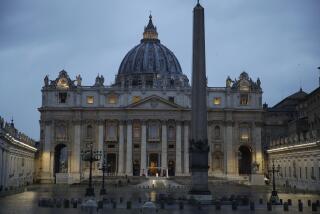Argentine Leader Welcomed to S.D. : Alfonsin to Receive Awards During Three-Day State Visit
- Share via
Argentine President Raul Alfonsin, who has won widespread praise for his efforts to restore democracy to his native land, arrived in San Diego on Friday evening and kicked off a three-day California visit during which he will be showered with awards and official plaudits.
Alfonsin, accompanied by a host of Argentine officials, journalists and others, emerged from his Argentine Air Force jet at 7:35 p.m. and was welcomed at the Lindbergh Field tarmac by Gov. George Deukmejian, Mayor Maureen O’Connor and a host of other dignitaries. On Tuesday, the San Diego Board of Port Commissioners had agreed to let the Boeing 707 aircraft use the airport, although it exceeds noise standards.
In brief comments on the tarmac, Alfonsin said he hoped his visit would serve to emphasize the links between Argentina and the United States, two nations that he said now enjoyed “excellent” relations. The 60-year-old president noted that he and his party had come from Philadelphia, the “cradle of liberty” for all the Americas.
Referring to O’Connor, Alfonsin added: “I see that (San Diego) has the good taste to choose, as mayors, women who are not only intelligent, but also beautiful and friendly.”
Earlier, O’Connor had presented Alfonsin with a key to the city and Deukmejian had praised him as a “strong proponent of democracy.”
After the airport ceremonies, Alfonsin and his entourage were escorted to waiting limousines as the U.S. Navy band played. They headed for a private reception at O’Connor’s home.
Today, Alfonsin is slated to receive statesmanship awards from UC San Diego and the Institute of the Americas, a private, nonprofit organization that studies Western Hemisphere issues. The institute, an independent group, chose Alfonsin as recipient of its first-ever “Man of the Americas” award for fostering democracy and peace.
“The award serves as a celebration of the rebirth of democracy in most of Latin America,” Richard W. Fisher, a Dallas banker who is the institute’s chairman of the board, said in a statement.
The institute, which is independent but is based on the La Jolla grounds of UC San Diego, was founded in 1984 by Theodore E. Gildred, the millionaire San Diego developer and philanthropist who is U.S. ambassador to Argentina. Gildred accompanied Alfonsin on his trip to the United States, which has been called non-official. No meeting is scheduled with President Reagan.
Alfonsin is scheduled to leave San Diego on Sunday morning, and, after stops in Los Angeles and the San Francisco Bay Area, is to return to Argentina on Monday. He arrived in San Diego on Friday from Philadelphia, where he received another statesmanship award and participated in 200th anniversary celebrations of the U.S. Constitution.
Although Alfonsin has visited the United States on several occasions, officials here said this was the first trip ever by an Argentine president to the West Coast of the United States. Alfonsin is the first Latin American head of state to visit San Diego since Mexican President Gustavo Diaz Ordaz met with President Nixon here on Sept. 3, 1970, according to the mayor’s office. Mexican President-elect Miguel de la Madrid met with President Reagan in San Diego on Oct. 8, 1982.
Alfonsin, who was elected president in 1983, is widely credited with restoring democracy to Argentina, a nation of 30 million people that was traumatized by the so-called “dirty war” against leftist guerrillas and their supposed supporters during military rule in the 1970s and early 1980s. During that period, security forces kidnaped and killed at least 6,000 people, who became known as the desaparecidos, or “disappeared.”
Alfonsin, considered one of Latin America’s leading democrats, returned constitutional government to Argentina in late 1983 after nearly seven years of harsh military dictatorship--and after the disastrous war with Great Britain over the islands known as the Malvinas in Argentina and as the Falklands in England. In perhaps his most compelling move, Alfonsin ordered widely publicized human rights trials against security officials implicated in the disappearances.
However, military leaders complained bitterly about the proceedings, and last Easter their discontent boiled to the surface with several dramatic uprisings by military units. Although Alfonsin managed to put down the mutiny, the potential threat of a military coup has remained.
Economically, development in Argentina is still hampered by a $53 billion foreign debt, the third largest in Latin America, after Brazil and Mexico.
Responding to military pressure, Alfonsin in May urged passage of a controversial law that would prohibit prosecution of most officers charged with torture, murder and other human rights abuses. The action, designed to short-circuit military unrest, was denounced as a “mockery of justice” by human rights groups in Argentina and elsewhere who oppose any amnesty for those implicated in the abuses.
More to Read
Sign up for Essential California
The most important California stories and recommendations in your inbox every morning.
You may occasionally receive promotional content from the Los Angeles Times.












![Vista, California-Apri 2, 2025-Hours after undergoing dental surgery a 9-year-old girl was found unresponsive in her home, officials are investigating what caused her death. On March 18, Silvanna Moreno was placed under anesthesia for a dental surgery at Dreamtime Dentistry, a dental facility that "strive[s] to be the premier office for sedation dentistry in Vitsa, CA. (Google Maps)](https://ca-times.brightspotcdn.com/dims4/default/07a58b2/2147483647/strip/true/crop/2016x1344+29+0/resize/840x560!/quality/75/?url=https%3A%2F%2Fcalifornia-times-brightspot.s3.amazonaws.com%2F78%2Ffd%2F9bbf9b62489fa209f9c67df2e472%2Fla-me-dreamtime-dentist-01.jpg)
